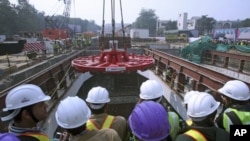India attracted record foreign investment of about $50 billion last year. Despite a slowdown in its economy, India continues to be an attractive global investment hub.
Much of the economic news in India during the last year was not positive. High inflation persisted. The rupee depreciated. The stock market lost nearly a quarter of its value. Growth rates were revised downwards to seven percent.
But foreign investors are still keeping faith with the potential of Asia’s third largest economy. In the first eleven months of 2011, foreign direct investment totaled $50.81 billion, up 13 percent from the previous year, according to a recent report by global consultancy Ernst & Young.
Analysts say India’s expanding middle class and a large and cheap labor force remain attractive for global businesses.
Chief economist at consultancy Crisil in Mumbai, D.K. Joshi says economic turbulence in Western countries means multinationals will have to explore Asian markets for growth. Among these, India’s huge domestic market is clearly one of the main magnets.
"Growth slowdown that is taking place in India needs to be looked at in the global context. If you look at the weak growth prospects in advanced countries, especially Europe and Japan, and tepid recovery in U.S., seven percent growth in India looks very good. So, from a growth differential perspective I think we are still very attractive," said Joshi.
India has been attracting foreign investment in sectors such as automobiles, telecommunication, technology and pharmaceuticals.
But the area where it desperately wants foreign investment is infrastructure - a sector in which India plans to spend one trillion dollars in the next five years. On a recent visit to the United States, Indian Finance Minister Pranab Mukherjee pitched for overseas businesses to help build the highways, ports and power plants which the country needs.
However, analysts point out that many foreign investors have been deterred by lack of governance and slow policy-making in India.
D.H. Pai Panandiker heads the economic think tank, RPG Goenka Foundation in New Delhi. He says foreign investment in India also remains below potential because many sectors of the economy are still closed to outsiders.
"It could have encouraged much more if reforms had come. It would have been a flood of foreign investment. What people are expecting is more liberal reform. Retailing is one area, but in others like insurance, banking… that would make a considerable difference to Indian economy," he said.
The government has been assuring investors that those reforms will come. Although it backtracked on opening the retail sector to overseas investors in December, because of political opposition, the government's top ministers have said that the decision is only on hold and will be implemented.
Investors are wanting to tap the potential of the Indian market and U.S. based companies are the leading investors in India.
On Monday, U.S. based Starbucks Corporation announced plans to open its first store in August, to woo coffee drinkers. It plans to soon expand to 50 outlets. Like other companies, analysts point out that Starbucks wants to expand in the Asia-Pacific region, where growth is accelerating faster than in the United States.
India Attracts Record Foreign Investment Despite Slowdown




